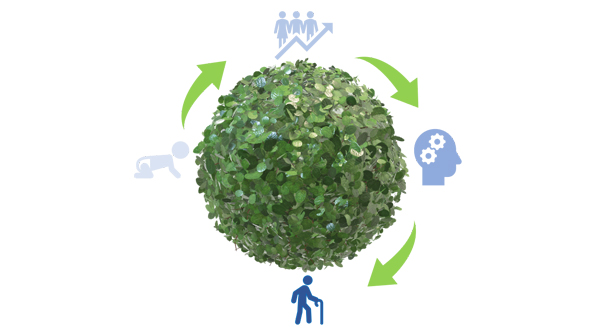
The debate on Social and Didactic Farming is on the rise recently. The renewed interest is mainly linked to the need of bringing more sustainability into our socio-economic systems. The concept precisely of Sustainability into socio-economic systems embodies both the outcomes different community aim to accomplish and the contest in which people take action.
Sustainability means at least fulfilling three main achievements: satisfying economic performance, high-level environmental preservation and valuable actions for social inclusion.
Socio-economic systems means considering all elements (resources: people, natural and cultural heritage, biodiversity, seas, industries, farms, cities, financial capacity etc.) existing in the world, and related linkages connecting them with each other. To better grasp the meaning of this holistic approach to see the world, let us think at a container in which all compounding elements are scattered distributed. We can picture a growingly complex rearrangement of the scarce basic ones (raw materials) compared to the beginning. Now transpose this way of thinking into the real world and consider the earth as being the container initially made only of raw material represented by natural resources. Then use the metaphor of the container as paradigm to understand that any transformation of human hands is just a rearrangement of the natural resources by growing levels of complexity.
The word sustainability is therefore a way to say that a better organization of the natural resources should take place to get the world closer to the original state. This can hand down to the next generations fair socio-economic systems in which a decent life will be still possible.
Social and Didactic farming constitute just a dimension among the many, i.e. the multifunctionality, that is able to steer subsets of the socio-economic systems toward increased sustainability.
Let us try to comprehend how this happens.
Social Farming
To be a social farm means to conduct activities that usually are in the hands of social organizations. “Social organizations” are here referred as those organizations dealing with refugees, immigrants, former convicted, former addicted, elderly and mentally/physically challenged people to make them work. Their purpose is in fact to make them feel accepted and helped by the surrounding social environment so that they improve the quality of their life. This is a typical way to engage in valuable actions for social inclusion.
In addition, let people work in private organizations is a way to save public financial resources. For example, elderly can be valued for their know-how on traditional methods and recover crafts; immigrants, refugees, former addicted and convicted might get confident with farming and build up a passion on it, so that, moving away from their past, they become an added value for the territory.
Didactic Farming
Didactics refers to the education that people shall acquire over their lifespan. This implies that it conveys the values whereby people build up their mindset and values, ultimately making right choices and decisions. When values lead individuals to take choices and decisions supporting unsustainable behaviours, the socio-economic system they live in fails. To avoid this happening, schooling systems shall strongly address the formation of appropriates mindset and self awareness.
In the wake of this introduction to the importance of teaching for a long-term sustainability, didactic farming is a solution to encourage people to become more environmentally sustainable. This happens because the learning process let pupils strongly interact with nature in order to acquire knowledge, eventually making them respecting it since their schooling journey. Benefits to the public financial resources are evident here too. Furthermore, lower environmental impacts are highly expected in the long-run.
Gianluigi De Pascale


